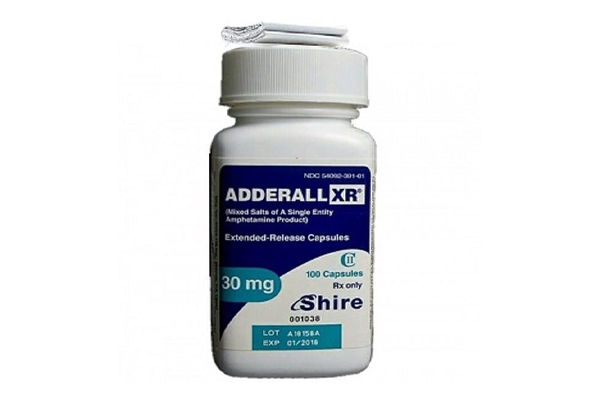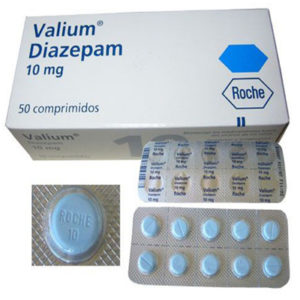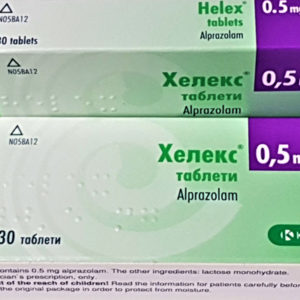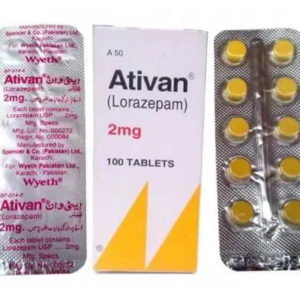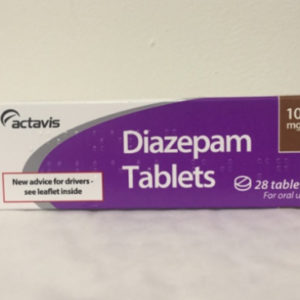Description
WHAT IS ADDERALL XR 30MG?
Adderall XR 30mg is a once-daily, timed-release stimulant medication primarily is used to treat Attention Deficit Hyperactivity Disorder (ADHD) in children ages 6-12, adolescents, and adults. According to the FDA, Adderall XR is a federally controlled substance (CII) because it can be abused or lead to dependence. It is an amphetamine.
Adderall XR may improve focus for people with inattentive ADHD, and decrease impulsivity and hyperactive behavior, the hallmark symptoms in patients with the condition. It has not been studied in children under the age of 6.
The American Academy of Pediatrics recommends treatment with behavioral therapy before medication for children under the age of 6. For children ages 6 to 11, the AAP says “The primary care clinician should prescribe US Food and Drug Administration–approved medications for ADHD and/or evidence-based parent- and/or teacher-administered behavior therapy as treatment for ADHD, preferably both.” Likewise, the National Institute of Mental Health finds the most successful treatment plans use a combination of ADHD medication, like Adderall XR, and behavior therapies.
Originally, Adderall was developed to treat narcolepsy; it should not be used to treat tiredness or other sleep-related problems without a doctor’s specific instructions and prescription.
HOW DO YOU USE ADDERALL XR?
Before starting or refilling an Adderall XR prescription, read the medication guide included with your pills, as it may be updated with new information.
This guide should not replace a conversation with your doctor, who has a holistic view of your or your child’s medical history, other diagnoses, and other prescriptions. If you have questions, ask your doctor or pharmacist before you begin taking the medication.
WHAT IS THE DOSAGE FOR ADDERALL XR?
As with all medications, follow your Adderall XR prescription instructions exactly. Adderall XR is taken orally, with or without food, once daily. The first dose is typically taken first thing in the morning; it should be taken at the same time each day for the best results.
Capsules should be swallowed whole with water or other liquids. If your child is unable to swallow the capsule, it can be opened and sprinkled over a spoonful of applesauce. Taken this way, the mixture should be swallowed whole without chewing, followed by a drink of water or other liquid. Capsules should never by crushed or chewed.
Capsules are available in 5mg, 10mg, 15mg, 20mg, 25mg and 30mg dosages. The time-release formulation is designed to maintain a steady level of medication in your body throughout the day.
The optimal dosage varies patient by patient; is not determined by age, weight, or height, but rather by how a person metabolizes the medication. Your doctor may adjust your daily dosage by 5mg increments until you or your child experiences the best response — that is, the lowest dosage at which you experience the greatest improvement in symptoms without side effects.
Children ages 6-12 should not exceed 30mg once daily. It is rare that a patient needs to exceed 40mg daily. Taking a high dosage for a prolonged time can result in withdrawal symptoms like fatigue, depression, insomnia, irritability, psychosis, or personality changes. If you or your child exceeds the prescribed dosage, call your doctor or poison control, or seek emergency medical care.
During treatment, your doctor may periodically ask you to stop taking your Adderall XR 30mg so that he or she can monitor ADHD symptoms; check vital statistics including blood, heart, and blood pressure; or evaluate height and weight. If any problems are found, your doctor may recommend discontinuing treatment.
Some patients report developing a tolerance to Adderall after long-term usage. If you notice that your dosage is no longer controlling your symptoms, talk to your doctor to plan a course of action.
WHAT SIDE EFFECTS ARE ASSOCIATED WITH ADDERALL XR?
The most common side effects of Adderall XR are as follows:
Children (ages 6 to 12): Loss of appetite, insomnia, abdominal pain, emotional lability, vomiting, nervousness, nausea, and fever.
Adolescents (ages 13 to 17): Loss of appetite, insomnia, abdominal pain, weight loss, and nervousness.
(6.1)
Adults: Dry mouth, loss of appetite, insomnia, headache, weight loss, nausea, anxiety, agitation, dizziness, tachycardia, diarrhea, asthenia, and urinary tract infections.
Adderall should not be taken off-label to help you lose weight. Weight loss is not an approved use for this medication.
Other serious side effects include slowed growth in children, seizures, and changes in eyesight. Taking Adderall XR may impair your or your teenager’s ability to drive, operate machinery, or perform other potentially dangerous tasks. This side effect usually wears off with time. If side effects are bothersome, or do not go away, talk to your doctor. Most people taking this medication do not experience any of these side effects.
Report to your doctor any heart-related problems or a family history of heart and blood pressure problems. Patients with structural cardiac abnormalities and other serious heart problems have experienced sudden death, stroke, heart attack, and increased blood pressure while taking Adderall XR 30mg. Stimulants can increase blood pressure and heart rate. Physicians should monitor these vital signs closely during treatment. Call your doctor immediately if you or your child experiences warning signs such as chest pain, shortness of breath, or fainting while taking Adderall XR.
Also disclose to your physician all mental health issues including any family history of suicide, bipolar illness, tics, or depression. The drug manufacturer, Shire, recommends evaluating patients for bipolar disorder, tics, and Tourette’s syndrome prior to stimulant administration. Adderall XR may create new or exacerbate existing behavior problems, bipolar illness, or Tourette’s syndrome. It can cause psychotic or manic symptoms in children and teenagers. Call your doctor immediately if you or your child experiences new or worsening mental health symptoms including hallucinations or sudden suspicions.
Discuss circulation problems with your doctor before taking Adderall XR 30mg, which has been known to cause numbness, coolness, or pain in fingers or toes, including Raynaud’s phenomenon. Report to your doctor any new blood-flow problems, pain, skin color changes, or sensitivities to temperature while taking Adderall XR.
Amphetamines like Adderall XR have a high potential for abuse and dependence, especially among people who do not have ADHD. It is a “Schedule II Stimulant,” a designation that the Drug Enforcement Agency uses for drugs with a high potential for abuse. Other Schedule II drugs include Dexedrine, Ritalin, and cocaine. People with a history of drug abuse should use caution when trying this medication. Taking the medication exactly as prescribed can reduce potential for abuse.
The above is not a complete list of potential side effects. If you notice any health changes not listed above, discuss them with your doctor or pharmacist.
WHAT PRECAUTIONS ARE ASSOCIATED WITH ADDERALL XR?
Store Adderall XR in a secure place out of the reach of children, and at room temperature. Do not share your Adderall XR 30mg prescription with anyone, even another person with ADHD. Sharing prescription medication is illegal, and can cause harm.
You should not take Adderall XR if you have any of the following conditions:
- Advanced arteriosclerosis
- Glaucoma
- Symptomatic cardiovascular disease
- Moderate to severe hypertension
- Hyperthyroidism
- Known hypersensitivity or idiosyncrasy to the sympathomimetic amines
- Glaucoma
- Agitated states
- History of drug abuse
- During or within the administration of monoamine oxidase inhibitors (MAOIs)
If you’re thinking of becoming pregnant, discuss the use of Adderall XR with your doctor. Animal studies indicate a potential risk of fetal harm; infants may be born prematurely, with low birth weight, have learning or motor deficits, or experience withdrawal. Adderall XR is passed through breastmilk, so it is recommended that mothers do not nurse while taking it.
The effects of Adderall XR on the elderly have not been studied.
WHAT INTERACTIONS ARE ASSOCIATED WITH ADDERALL XR?
Before taking Adderall XR, discuss all other active prescription medications with your doctor. Adderall XR 30mg can have a dangerous, possibly fatal, interaction with antidepressants including MAOIs.
Exercise caution with medicines including anti-psychotics, lithium, narcotic pain medicines, seizure medications, blood thinners, blood pressure medications, stomach acid medications — like antacids —, and cold or allergy medicines that contain decongestants. Even over-the-counter medications may contain ingredients that raise or lower the level of the medication in your blood to a dangerous level.
Share a list of all vitamin or herbal supplements, and prescription and non-prescription medications you take with the pharmacist when you fill your prescription, and let all doctors and physicians know you are taking Adderall XR 30mg before having any surgery or laboratory tests. The above is not a complete list of all possible drug interactions.
